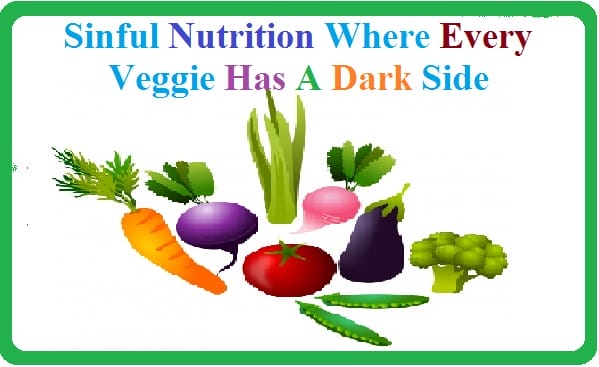Dear audience, Welcome to my another blog post. Today I am going to discuss sinful nutrition where every veggie has a dark side . It is important because we all care about what we are eating and our precious health. So let’s start.
You might think you’re doing your body a favor by eating healthy, but did you know that even vegetables can have a dark side? In this blog post, we’ll explore the concept of “sinful nutrition” and how even the most innocent-seeming foods can be detrimental to your health. From hidden sugars to unhealthy fats, there’s more to consider than just calories when it comes to making healthy choices. So read on, and be sure to think twice before reaching for that next salad!
The Dark Side of Vegetables
While vegetables are typically seen as healthy and nutritious, there is a dark side to them that many people are unaware of. For example, did you know that some vegetables can actually be harmful to your health? Here are some of the most dangerous vegetables out there:
- Tomatoes – Tomatoes contain a chemical called lycopene, which has been linked to cancer.
- Potatoes – Potatoes contain high levels of starch, which can lead to weight gain and other health problems.
- Eggplants – Eggplants contain solanine, a toxic substance that can cause gastrointestinal distress.
- peppers – Peppers contain capsaicin, a compound that can irritate the skin and eyes.
- Cucumbers contain cucurbitacin, a substance that can cause stomach cramps and diarrhea.
So, next time you’re at the grocery store, be sure to think twice before putting these vegetables into your cart!
The Dark Side of Fruits
Though sinful nutrition where every veggie has a dark side such as fruits are often seen as healthy and nutritious, they can actually have a dark side. Fruits contain natural sugars that can cause spikes in blood sugar levels, as well as acids that can erode tooth enamel. Some fruits also contain toxins that can be harmful to the body if consumed in large quantities.
When it comes to blood sugar levels, fructose is the main culprit. Fructose is a simple sugar found in most fruits, and it’s metabolized differently than other types of sugar. When fructose is consumed in large quantities, it can cause spikes in blood sugar levels. This can be especially problematic for people with diabetes or other conditions that require careful management of blood sugar levels.
The acids found in some fruits can also damage tooth enamel according to the best dentist in Charlotte NC. This is because the acids interact with the minerals in tooth enamel, causing them to break down over time. If teeth are exposed to too much acidity, it can lead to cavities and other problems.
Some fruits also contain toxins that can be harmful if consumed in large quantities. For example, apricots contain cyanide, which is poisonous in high doses. Cherries also contain cyanide, but only in the pits; however, eating too many cherry pits can still be dangerous. Other poisonous fruits include rhubarb leaves (which contain oxalic acid) and unripe tomatoes (which contain solanine). Though fruit is often seen as healthy and nutritious, it’s important too.
The Dark Side of Grains
Whole sinful nutrition where every veggie has a dark side such as grains may seem like a healthy, whole-food choice, but they actually have a pretty dark side. For one, they’re loaded with gluten, which has been linked to everything from digestive problems to brain damage. They’re also high in lectins, which can cause inflammation and other health issues. And let’s not forget about the phytic acid in grains, which can bind to minerals like iron and calcium and prevent them from being absorbed by the body.
So what’s the bottom line? Grains are not the healthy, nutrient-dense foods they’re made out to be. If you’re looking to improve your health, it’s best to steer clear of them altogether.
The Dark Side of Dairy
When it comes to dairy, there are a few dark sides that you should be aware of. For one, dairy is one of the top sources of unhealthy saturated fat. Saturated fat has been linked to heart disease, stroke, and other chronic health conditions. Additionally, dairy products are often high in cholesterol and salt, which can also contribute to negative health outcomes.
Another downside to dairy is that it can be difficult to digest for some people. Those with lactose intolerance or other sensitivities may experience bloating, gas, and other uncomfortable symptoms after consuming dairy products. And finally, the dairy industry has come under fire for its treatment of animals. From inhumane living conditions to forced milk production, many activists believe that the dairy industry is cruel to animals.
So, what does this all mean for you? If you consume dairy, it’s important to be aware of these potential risks and take steps to mitigate them. Choose low-fat or skim versions of dairy products when possible and opt for organic options that come from humanely treated cows. You can also look for plant-based alternatives to dairy milk, such as almond milk or soy milk. By making smart choices about your dairy consumption, you can enjoy the benefits without taking on too much risk.
The three types of sinners about sinful nutrition where every veggie has a dark side
There are three types of sinners when it comes to nutrition: those who indulge, those who overindulge, and those who abstain.
Indulgers are the ones who enjoy the occasional unhealthy treat. They might have a slice of cake at a birthday party or eat fast food on occasion. While indulging isn’t great for your health, it’s not the end of the world.
Overindulgers are the ones who often go overboard with their eating. They might constantly be snacking on unhealthy foods or eating large portions at meals. This type of behavior can lead to weight gain and other health problems.
Abstainers are the ones who avoid all unhealthy foods. They might be on a strict diet or have allergies or sensitivities that limit what they can eat. While abstaining from unhealthy foods is commendable, it can also be difficult to maintain long-term.
The case for broccoli
The humble broccoli may not look like much, but this unassuming vegetable is actually packed with nutrients that can benefit your health in a number of ways. For starters, broccoli is an excellent source of vitamins C and K, as well as dietary fiber. It also contains potent antioxidants that can help protect your cells from damage.
Some research has even suggested that broccoli may help to lower the risk of certain types of cancer, including ovarian and colorectal cancer. So if you’re looking for a healthy addition to your diet, you could do worse than giving broccoli a try.
The case against Brussels sprouts
Though Brussels sprouts have gotten a bad rap over the years as a vegetable that no one likes, there is actually a case to be made against them. For one, they are high in sulfur, which can give them a strong flavor that some people find unpleasant. Additionally, Brussels sprouts are difficult to digest and can cause gas and bloating. Finally, Brussels sprouts contain goitrogens, which can interfere with thyroid function.
The bottom line is that nutrition is a complex science, and there are no easy answers. Every food has potential risks and benefits, and it’s important to consider all of them before making any decisions about what to eat.
Read More Valuable Contents like sinful nutrition where every veggie has a dark side :
Never miss these food items while grocery shopping
Beautiful Places To Visit In Belgium In Vacation
What Could Be the Side Effects of Using CBD?
Get a Healthy Diet Plan for Fast Weight Loss











































